NATIONAL NEWS
Mississippi River lock & dam undergoing once every 20-year dewatering for maintenance

Lockmaster Steve Heidbrider walks down to the bottom at Lock and Dam No. 2 Tuesday, January 30, 2024 on the Mississippi River in Hastings, Minnesota. Late last year, the U.S. Army Corps of Engineers, St. Paul District dewatered the lock chamber for routine inspection, maintenance and repairs. Locks are dewatered on a 20-year cycle. The dewatering is accomplished by placing large bulkheads at the upstream and downstream ends of the lock chamber to prevent the flow of water into the chamber. The lock will reopen for shipping on March 5. Mark Hoffman/Milwaukee Journal Sentinel
Mark Hoffman/Milwaukee Journal Sentinel
A worker performs maintenance on the upstream gates at Lock and Dam No. 2 Tuesday, January 30, 2024 on the Mississippi River in Hastings, Minnesota. Late last year, the U.S. Army Corps of Engineers, St. Paul District dewatered the lock chamber for routine inspection, maintenance and repairs. Locks are dewatered on a 20-year cycle. The dewatering is accomplished by placing large bulkheads at the upstream and downstream ends of the lock chamber to prevent the flow of water into the chamber. The lock will reopen for shipping on March 5. Mark Hoffman/Milwaukee Journal Sentinel
Mark Hoffman/Milwaukee Journal Sentinel
The bulkhead, left, prevents water from entering at Lock and Dam No. 2 so work can be done on the gates to the chamber, right, Tuesday, January 30, 2024 on the Mississippi River in Hastings, Minnesota. Late last year, the U.S. Army Corps of Engineers, St. Paul District dewatered the lock chamber for routine inspection, maintenance and repairs. Locks are dewatered on a 20-year cycle. The dewatering is accomplished by placing large bulkheads at the upstream and downstream ends of the lock chamber to prevent the flow of water into the chamber. The lock will reopen for shipping on March 5. Mark Hoffman/Milwaukee Journal Sentinel
Mark Hoffman/Milwaukee Journal Sentinel
The Marquette Transportation towboat Angela K travels downstream through Lock and Dam No. 2 Wednesday, November 15, 2023 on the Mississippi River in Hastings, Minnesota. After It was constructed in 1930 by the, the walls settled and tilted which led to construction of a second lock completed in 1948.
Mark Hoffman/Milwaukee Journal Sentinel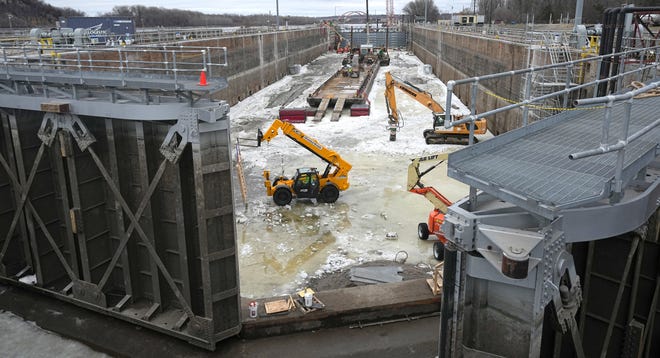
The gates on the upstream end of Lock and Dam No. 2 frame ongoing maintenance work Tuesday, January 30, 2024 on the Mississippi River in Hastings, Minnesota. Late last year, the U.S. Army Corps of Engineers, St. Paul District dewatered the lock chamber for routine inspection, maintenance and repairs. Locks are dewatered on a 20-year cycle. The dewatering is accomplished by placing large bulkheads at the upstream and downstream ends of the lock chamber to prevent the flow of water into the chamber. The lock will reopen for shipping on March 5. Mark Hoffman/Milwaukee Journal Sentinel
Mark Hoffman/Milwaukee Journal Sentinel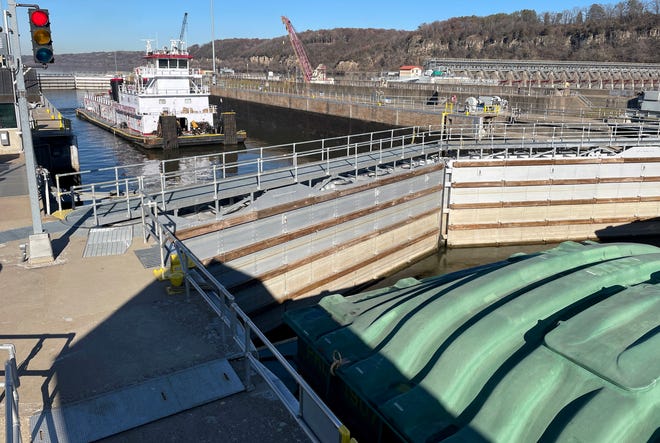
The Marquette Transportation towboat Angela K travels downstream through Lock and Dam No. 2 Wednesday, November 15, 2023 on the Mississippi River in Hastings, Minnesota. After It was constructed in 1930 by the, the walls settled and tilted which led to construction of a second lock completed in 1948.
Mark Hoffman/Milwaukee Journal Sentinel
Maintenance foreman Mike Gunderson, right, talks with workers at Lock and Dam No. 2 Tuesday, January 30, 2024 on the Mississippi River in Hastings, Minnesota. Late last year, the U.S. Army Corps of Engineers, St. Paul District dewatered the lock chamber for routine inspection, maintenance and repairs. Locks are dewatered on a 20-year cycle. The dewatering is accomplished by placing large bulkheads at the upstream and downstream ends of the lock chamber to prevent the flow of water into the chamber. The lock will reopen for shipping on March 5. Mark Hoffman/Milwaukee Journal Sentinel
Mark Hoffman/Milwaukee Journal Sentinel
A worker stands in front of the bulkhead that prevents water from entering Lock and Dam No. 2 Tuesday, January 30, 2024 on the Mississippi River in Hastings, Minnesota. Late last year, the U.S. Army Corps of Engineers, St. Paul District dewatered the lock chamber for routine inspection, maintenance and repairs. Locks are dewatered on a 20-year cycle. The dewatering is accomplished by placing large bulkheads at the upstream and downstream ends of the lock chamber to prevent the flow of water into the chamber. The lock will reopen for shipping on March 5. Mark Hoffman/Milwaukee Journal Sentinel
Mark Hoffman/Milwaukee Journal Sentinel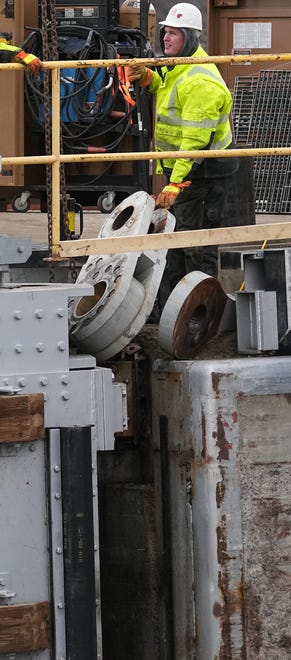
Workers replace part of the hinge system of the downstream gates at Lock and Dam No. 2 Tuesday, January 30, 2024 on the Mississippi River in Hastings, Minnesota. Late last year, the U.S. Army Corps of Engineers, St. Paul District dewatered the lock chamber for routine inspection, maintenance and repairs. Locks are dewatered on a 20-year cycle. The dewatering is accomplished by placing large bulkheads at the upstream and downstream ends of the lock chamber to prevent the flow of water into the chamber. The lock will reopen for shipping on March 5.
Mark Hoffman/Milwaukee Journal Sentinel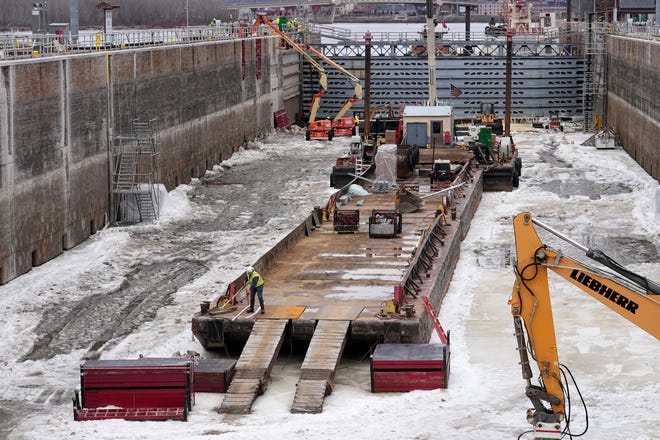
A barge sits on the bottom of the chamber at Lock and Dam No. 2 Tuesday, January 30, 2024 on the Mississippi River in Hastings, Minnesota. Late last year, the U.S. Army Corps of Engineers, St. Paul District dewatered the lock chamber for routine inspection, maintenance and repairs. Locks are dewatered on a 20-year cycle. The dewatering is accomplished by placing large bulkheads at the upstream and downstream ends of the lock chamber to prevent the flow of water into the chamber. The lock will reopen for shipping on March 5. Mark Hoffman/Milwaukee Journal Sentinel
Mark Hoffman/Milwaukee Journal Sentinel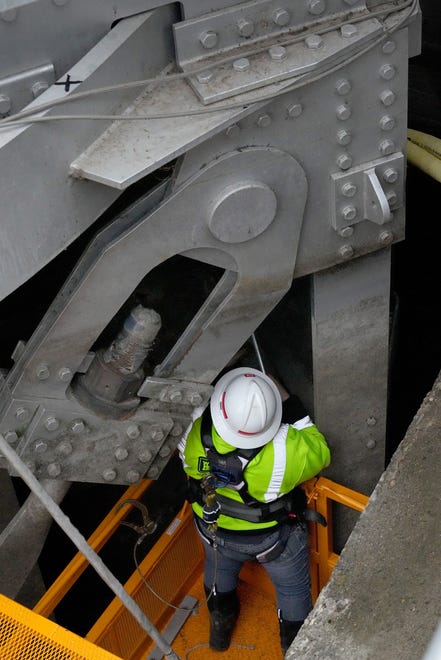
A worker performs maintenance on the upstream gates at Lock and Dam No. 2 Tuesday, January 30, 2024 on the Mississippi River in Hastings, Minnesota. Late last year, the U.S. Army Corps of Engineers, St. Paul District dewatered the lock chamber for routine inspection, maintenance and repairs. Locks are dewatered on a 20-year cycle. The dewatering is accomplished by placing large bulkheads at the upstream and downstream ends of the lock chamber to prevent the flow of water into the chamber. The lock will reopen for shipping on March 5. Mark Hoffman/Milwaukee Journal Sentinel
Mark Hoffman/Milwaukee Journal Sentinel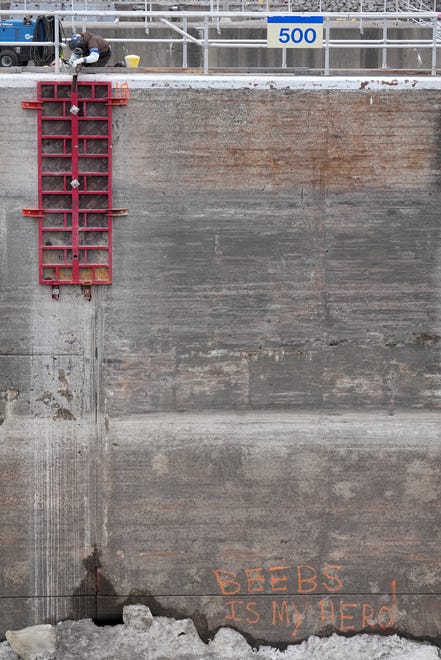
Concrete forms are attached to the walls at Lock and Dam No. 2 Tuesday, January 30, 2024 on the Mississippi River in Hastings, Minnesota. Late last year, the U.S. Army Corps of Engineers, St. Paul District dewatered the lock chamber for routine inspection, maintenance and repairs. Locks are dewatered on a 20-year cycle. The dewatering is accomplished by placing large bulkheads at the upstream and downstream ends of the lock chamber to prevent the flow of water into the chamber. The lock will reopen for shipping on March 5. Mark Hoffman/Milwaukee Journal Sentinel
Mark Hoffman/Milwaukee Journal Sentinel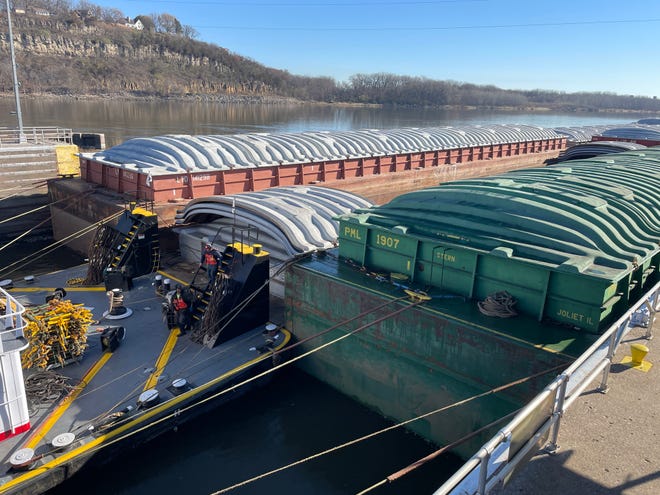
The Marquette Transportation towboat Angela K travels downstream through Lock and Dam No. 2 Wednesday, November 15, 2023 on the Mississippi River in Hastings, Minnesota. After It was constructed in 1930 by the, the walls settled and tilted which led to construction of a second lock completed in 1948.
Mark Hoffman/Milwaukee Journal Sentinel Mark Hoffman
Mark Hoffman